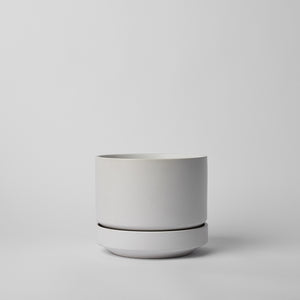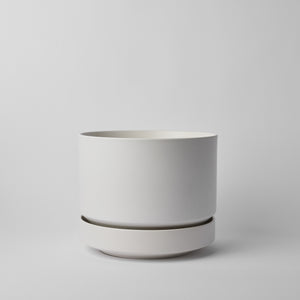Styling Plants in a Mid-Century Modern Space
Nov 10, 2020
To shine a spotlight on the transformative impact of greenery in different spaces - and the highly versatile nature of Revival Ceramics - we’ve created a three-part series showing you how Revival plant pairings can complement, elevate, and brighten a wide range of design trends.
Last week we took a closer look at ceramic cylinder pairings in the context of minimalist design. This week we’re taking it all the way back to mid-century modern - the design movement which first popularized the now iconic ceramic cylinder planter. Before you read on, check out our blog on Mid-Century Modern America to brush up on the history of this timeless aesthetic.
Step 1: The Basics
- Mid-century modern is best described as the perfect balance of modern and cozy, futuristic and reminiscent, and is most notably responsible for the modernization of wooden furniture. For a deeper dive into the make-up of this aesthetic, check out How To Style Mid-Century Modern Today.
- The iconic design era brought the ceramic cylinder planter to its height of fame, subsequently popularizing the houseplant.
- In a mid-century modern design space the cylinder planter is in its element, which is why you can’t go wrong with a classic Revival Ceramic plant pairing.

Photo Credit: A&B Curated
Step 2: The Layout
- Go for bold houseplant ensembles and use placement techniques to frame the layout of the room.
-
Style plant pairings based on size in your mid-century modern home:
Large 10 or 12 inch statement planters can hug couch ends. Medium 6 or 8 inch pairings sit atop unique side tables, or beside statement chairs. Small 4 inch plants seamlessly tie into shelves and coffee tables.
- In rooms with more design elements at play, incorporate medium and small houseplants that balance the spread of home goods.
- For less busy spaces, create a focal point by featuring a larger, fuller houseplant ensemble that will draw the eye. 12 or 14 inch planters are the perfect size for a bold conversation piece.
Step 3: The Color Scheme
- Because Revival Ceramics were designed to emulate the original cylinder planters used in mid-century modern design spaces, you can’t go wrong with any of our hand-selected color options.
- As a guide orange and brown, chartreuse and gray, pink and brown, and teal with brown or white are some traditional mid-century modern color pairings.
- Incorporating Revival Ceramics stands is an easy way to tie in natural shades of brown and create height variation.

Houseplants are the cornerstone of mid-century modern design and there’s no better way to pull off this aesthetic than with the same classic cylinders that came to characterize the mid-century design era. Tag us on Instagram @LBE.design to show us your mid-century modern space and stay tuned for next week’s look at Revival Ceramics paired in a Bohemian living space.










